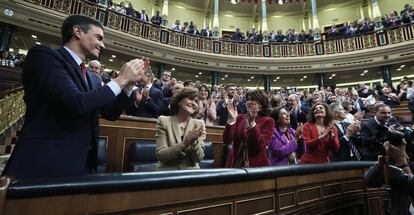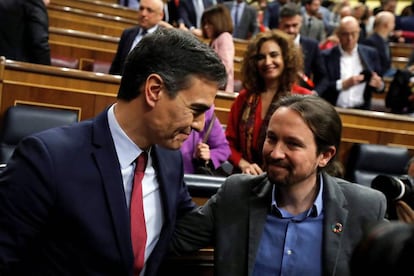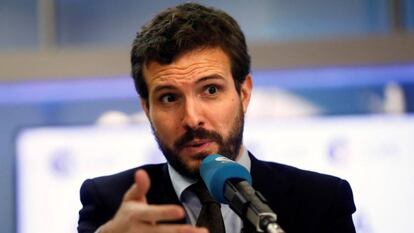Spain’s new PM mulls Cabinet lineup ahead of thorny political term
Pedro Sánchez of the Socialist Party will lead the first coalition government in recent democratic history after securing parliamentary backing by a razor-thin margin of two votes

Spain’s first coalition government since the democratic transition of the late 1970s is already a reality. On Tuesday, Pedro Sánchez of the Socialist Party (PSOE) was confirmed as the prime minister after a slim majority of lawmakers endorsed the winner of the November 10 election.
Unidas Podemos leader Pablo Iglesias
With a lead of just two votes (167 to 165), it was the tightest investiture victory in four decades, reflecting the new political fragmentation in a country once dominated by the PSOE and the conservative Popular Party (PP). The aggressive rhetoric heard in Congress during the three-day debate suggests that the new government, which only holds 155 seats in the 350-strong house, will face an uphill battle to implement its planned reforms.

Sánchez’s confirmation in office ends eight months of a caretaker administration marked by two general elections. He is scheduled to be sworn in on Wednesday, when he will pledge allegiance to the Spanish Constitution in front of King Felipe VI.
The PSOE leader has given himself a week to announce the makeup of his new Cabinet, which will include members of the leftist alliance Unidas Podemos. This latter group has already revealed that its leader, Pablo Iglesias, will be one of three deputy prime ministers, and in charge of two main departments: social affairs and implementing the UN’s 2030 Agenda for sustainable development, which includes poverty and climate issues.
Congressman under police protection

A lawmaker from a small regional party who voted in favor of Pedro Sánchez’s investiture bid on Tuesday has been placed under police protection after receiving numerous threats from detractors of a Socialist Party-led coalition government.
Tomás Guitarte is the sole representative of Teruel Existe, a grassroots group aiming to focus attention on the problems faced by rural, depopulated parts of Spain such as the province of Teruel, in the region of Aragón.
After Guitarte announced that he would support Sánchez’s bid, he began receiving thousands of messages through email and Facebook, some of which included menacing content.
“Just like with other lawmakers, there has been an evaluation of the threats and the risk level, and measures have been adopted to guarantee his safety,” said sources at the Interior Ministry. Guitarte has already filed a formal complaint over graffiti in his home province calling him a “traitor.”
Speaking in Congress on Tuesday, Iglesias promised improved conditions for women and workers, and suggested that he expects to face fierce opposition from right-wing political groups. “Pedro, they are not going to attack us for what we do, but for what we are,” he told the prime minister.
The new coalition government, which lacks the majority to push legislation through parliament and will require case-by-case support from other groups, is facing a particularly difficult term on several fronts.
Chief among the upcoming challenges is the situation in Catalonia. Sánchez’s victory was made possible in part through an abstention by the Catalan Republican Left (ERC), a separatist party that has negotiated the opening of talks between the central and Catalan governments over the “political conflict.” Without talks, “there will be no political term,” warned ERC congressional spokesman Gabriel Rufián during the investiture debate.
Territorial coordination will be under the purview of Carmen Calvo, who is expected to return to her deputy PM position. A second deputy PM, Nadia Calviño, will be in charge of economic policy, while Pablo Iglesias is to be Sánchez’s third deputy PM.
Other returning ministers include José Luis Ábalos, who will helm Public Works, Fernando Grande-Marlaska at the Interior Ministry, and Teresa Ribera in charge of Ecological Transition.
As for the remaining members of the Cabinet, PSOE sources have admitted that some decisions still need to be made. Officials are poring over candidate resumes and backgrounds, in a bid to avoid situations such as those that led to the early resignation of two newly appointed ministers in 2018, one over tax fraud and the other over university degree irregularities.
Row over ETA

The tensest moments inside Congress during the three-day investiture debate took place when two lawmakers for EH Bildu, a Basque party with roots in groups that supported the now-defunct terrorist organization ETA, said that they wanted “truth, justice and reparation for all victims: those of ETA, those of GAL [1980s anti-ETA death squads], those of the Basque Spanish Battalion [late 1970s neofascist paramilitary group], those of the parapolice violence and the thousands who lie buried in mass graves.”
Popular Party (PP) president Pablo Casado said on Tuesday that ETA’s more than 800 victims had been deeply offended by the radical leftist lawmakers’ remarks. “I feel infinite nausea hearing ETA’s administrators speak about authoritarianism inside a chamber where there is only room for half as many people as they murdered,” he said.
The multiple references to ETA during the debate triggered different reactions among victims of the group’s six-decade campaign of terror. José María Múgica, the son of a murdered Socialist politician, sent Sánchez a letter expressing “contempt” for the latter’s decision to accept an EH Bildu abstention to further his investiture bid. But Consuelo Ordóñez, sister of a PP councilor killed in 1995, asked Pablo Casado to “stop using the victims of terrorism and presuming to represent them.”
With reporting by Anabel Díez, José Marcos, Inés Santaeulalia and Lucía Abellán.
English version by Susana Urra.
Tu suscripción se está usando en otro dispositivo
¿Quieres añadir otro usuario a tu suscripción?
Si continúas leyendo en este dispositivo, no se podrá leer en el otro.
FlechaTu suscripción se está usando en otro dispositivo y solo puedes acceder a EL PAÍS desde un dispositivo a la vez.
Si quieres compartir tu cuenta, cambia tu suscripción a la modalidad Premium, así podrás añadir otro usuario. Cada uno accederá con su propia cuenta de email, lo que os permitirá personalizar vuestra experiencia en EL PAÍS.
¿Tienes una suscripción de empresa? Accede aquí para contratar más cuentas.
En el caso de no saber quién está usando tu cuenta, te recomendamos cambiar tu contraseña aquí.
Si decides continuar compartiendo tu cuenta, este mensaje se mostrará en tu dispositivo y en el de la otra persona que está usando tu cuenta de forma indefinida, afectando a tu experiencia de lectura. Puedes consultar aquí los términos y condiciones de la suscripción digital.








































